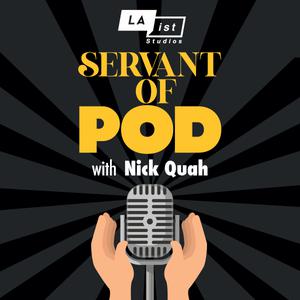
Servant of Pod with Nick Quah
LAist Studios
In the world of podcasts, anyone can tell their story. From major media institutions to mom and pop shops starting from scratch. Let Nick Quah guide you through this ever-changing world, as he speaks with the producers, hosts, and executives that are shaping the culture of podcasting.
- 31 minutes 16 secondsWhere We Are Now, Again
Servant of Pod is coming to an end, and since this is the final episode, we figured we’d close out the show the same way we began: in a pandemic. (Kidding, but not really.) To send off the podcast, Nick is joined by The Verge’s Ashley Carman to build a (very) brief picture of where the podcast world is at the outset of 2021.
This program is made possible in part by the Corporation for Public Broadcasting, a private corporation funded by the American people.
24 March 2021, 9:30 am - 29 minutes 7 secondsSarah Marshall of You’re Wrong About and Why are Dads?
Writer, podcaster, and cultural critic Sarah Marshall has a distinct expertise: diving deep into the messy backstories of widely known subjects that are often overlooked in their elemental details. This week, Nick speaks with Marshall about the way she approaches her topics, her various projects, and the larger enterprise of sitting, listening, and forging an emotional connection with larger than life figures.
This program is made possible in part by the Corporation for Public Broadcasting, a private corporation funded by the American people.
17 March 2021, 9:30 am - 23 minutes 45 secondsThe “Spectacle” of Reality Television
Some call it “guilty pleasure,” some call it trash, but whatever description you use, you can’t deny that reality television is now firmly baked into the firmament of American reality. The relationship between the genre and podcasting is also increasingly felt, as more reality stars are starting their own shows — and more podcasts are affecting what’s happening on the screen. This week, Nick speaks with Mariah Smith, a reality TV expert and the host of Spectacle, a new series about the history of reality television and what it all means.
This program is made possible in part by the Corporation for Public Broadcasting, a private corporation funded by the American people.
10 March 2021, 10:30 am - 30 minutes 49 secondsTrue Crime and Through the Cracks
True crime podcasts are some of the most popular and profitable shows being made, despite (or perhaps because of) its occasional ethical queasiness. This week: a roundtable discussion with Crime Writers On…’s Rebecca Lavoie and WAMU’s Jonquilyn Hill about the appeal, pitfalls, and opportunities of the genre. They also talk about Hill’s new project, Through the Cracks, which both draws from — and challenges — the fundamental true crime mechanics.
This program is made possible in part by the Corporation for Public Broadcasting, a private corporation funded by the American people.
3 March 2021, 10:30 am - 29 minutes 7 secondsWhat does a Podcast Producer do?
The Podcast Producer: by and large, it is the atomic unit of labor in the podcast business, and it’s a role that means and involves many, many things depending on the specific situation. This week: a roundtable discussion with Chiquita Channel Paschal and Emmanuel Dzotsi about what it means to be a producer, the path to becoming a full-time producer these days, and the changes they’d make if they ruled the industry.
This program is made possible in part by the Corporation for Public Broadcasting, a private corporation funded by the American people.
24 February 2021, 10:30 am - 26 minutes 39 secondsTravis McElroy
The Brothers McElroy — Travis, Justin, Griffin — are among the most prolific creators you’ll find in this community. Since launching the wildly popular My Brother, My Brother, and Me in 2010, the brothers have gone on to create an entire universe of McElroy-affiliated podcasts: The Adventure Zone, Schmanners, ‘Til Death Do Us Blart, and Sawbones, among them. This week, Nick talks to just one of them, Travis, about the nature of their popularity, what it’s like to do business as brothers, and their new book, “Everybody Has a Podcast (Except You).”
This program is made possible in part by the Corporation for Public Broadcasting, a private corporation funded by the American people.
17 February 2021, 10:30 am - 24 minutes 54 secondsIt’s Been a Minute with Sam Sanders
It’s Been a Minute with Sam Sanders always feels as much of a surprise as it does a gift. Originally developed as a replacement for the time slot previously occupied by Car Talk, the podcast has emerged to become an endlessly interesting take on the generalist news magazine show, seamlessly tying together a blend of news, interviews, and cultural analysis that are routed through Sanders’ own universe of interests. This week, Nick talks to Sanders about his path to the mic, how he thinks about the show and his relationship to his listeners, and the whiteness of public radio.
This program is made possible in part by the Corporation for Public Broadcasting, a private corporation funded by the American people.
10 February 2021, 10:30 am - 27 minutes 2 secondsRevisiting the Legacy of Serial
It’s been a little more than six years since Serial made its debut and became one of the most successful and influential podcasts in the history of the medium. Since then, so much has been said and written about that first season, which continues to carry a deep legacy not just for the nature of its phenomenon, but for how many people in podcasting feel about that phenomenon. This week, Nick is joined by the New Yorker’s Sarah Larson to unpack the long tail of Serial, and how it continues to shape podcasting today.
This program is made possible in part by the Corporation for Public Broadcasting, a private corporation funded by the American people.
3 February 2021, 10:30 am - 28 minutes 12 secondsAnything For Selena
Selena Quintanilla is a cultural icon for many, but for Maria Garcia, she's much more than that. For Maria, who was raised in El Paso, Texas, and lived and worked on the border for years, Selena was a figure that helped her — and many other young girls and women like her — find a place in a world where they didn't feel like they belonged. This week, Nick speaks with Maria about Anything for Selena, her new series from WBUR and Futuro Studios, which revisits the legacy of Selena, with an ear to trying to unpack how, exactly, she changed culture.
This program is made possible in part by the Corporation for Public Broadcasting, a private corporation funded by the American people.
27 January 2021, 10:30 am - 24 minutes 31 secondsDecoder Ring
Why did the mullet become a thing? Why did everybody go crazy over Cabbage Patch dolls? And why would anybody ever go on a reality TV show? These are the typical questions you'd find asked in Slate's Decoder Ring, one for the smartest podcasts out there and one that more people should be checking out. In each episode, host Willa Paskin, usually the TV critic for Slate, picks up a different cultural object — a word, a phenomenon, a moment, a device — and subjects it to a simple question: why? This week, Nick talks to Willa about how she and her producer go about choosing the topics of their deep-dives, what makes her so interested in cultural histories and how they pulled together their epic two-part series on Jane Fonda.
This program is made possible in part by the Corporation for Public Broadcasting, a private corporation funded by the American people.
20 January 2021, 10:30 am - 25 minutes 32 secondsWhat Comes Next for Crooked Media?
Crooked Media was founded by a group of former Obama staffers in the wake of Trump’s surprise win in the 2016 presidential election. Over the next four years, the media company built a strong listenership by essentially serving as a focal point for a certain kind of progressive voter that stands in opposition to the Trump presidency. Now that the United States is due to be led by Democrats, the obvious question abounds: what does this mean for Crooked Media? Nick talks to Tanya Somanader, Crooked Media’s Chief Content Officer, about what comes next.
This program is made possible in part by the Corporation for Public Broadcasting, a private corporation funded by the American people.
13 January 2021, 10:45 am - More Episodes? Get the App
Your feedback is valuable to us. Should you encounter any bugs, glitches, lack of functionality or other problems, please email us on [email protected] or join Moon.FM Telegram Group where you can talk directly to the dev team who are happy to answer any queries.
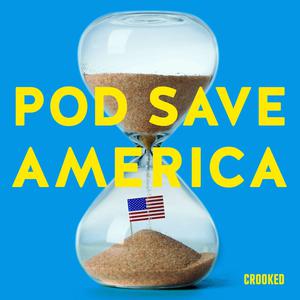 Pod Save America
Pod Save America
 The Daily
The Daily
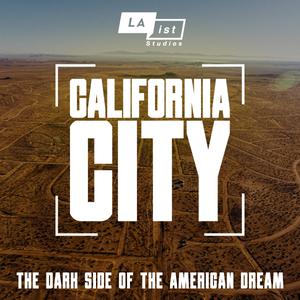 California City
California City
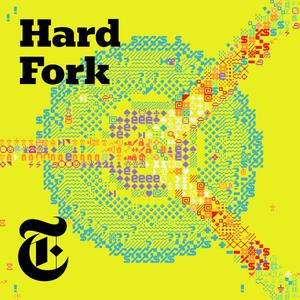 Hard Fork
Hard Fork
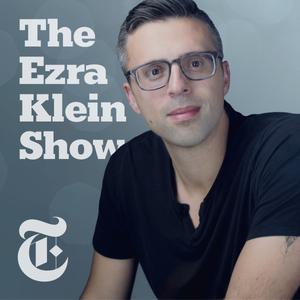 The Ezra Klein Show
The Ezra Klein Show
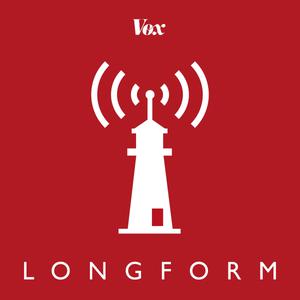 Longform
Longform